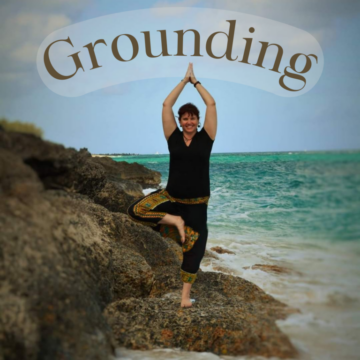
What does grounding mean?
From the scientific perspective, grounding is the process of realigning to the electrical current of the Earth. It is known as Earthing and “refers to the discovery that bodily contact with the Earth’s natural electric charge stabilizes the physiology at the deepest levels, reduces inflammation, pain, and stress, improves blood flow, energy, and sleep, and generates greater well-being” (Integrative and lifestyle medicine strategies should include Earthing (grounding): Review of research evidence and clinical observations). The practice of grounding in this case entails making barefoot connection to the Earth for at least ten minutes every day. There are also special mats that can be purchased that use the grounded part of an outlet (the round hole) to connect to the Earth’s electrical current. There is significant scientific research that demonstrates the health benefits of Earthing.
From an esoteric perspective, grounding is a sense of connecting to the Earth. There are practices where we may imagine that we are growing roots to connect to the energy at the center of the Earth and then draw that energy up into the core of the body. This helps us to feel connected, centered, and stable, which eases stress and anxiety. The purpose is to feel connected to our bodies as well as the present moment.
Feeling our distinct energy is important. Being insulated from the earth, rather than connected to it, helps us to feel ourselves. There is a magnetic pull of the Earth. That same electrical energy that we can use to heal ourselves may interfere with a deeper connection to ourselves. This is the purpose behind using a sheepskin blanket during the practice of yoga in Kundalini. Practitioners report experiencing deeper states of connection to their higher selves and the universe.
What do we really mean when we say “ground?”
The real purpose of grounding is reconnecting to our bodies. Think of it not as a practice of connecting to the planet, we are already here. Instead, it is a practice of inhabiting our bodies to the fullest. This is called embodiment. When we are embodied, we are present and calm. Most people would like to feel present and calm. These are of the utmost importance for anyone who holds space for others, be it a yoga teacher, mental health professional, caregiver, etc.
Pain, emotional discomfort, trauma, substances, grief, stress, anxiety, depression, are just a few reasons why we may disconnect from our bodies. Ultimately, we do not feel safe in our bodies and so we choose to live from the neck up. Exiting our bodies is an important strategy when we are overwhelmed. The problem lies in the inability to re-enter the body or feel safe in our bodies. This is where yoga helps. Through the right practice, we are invited to re-inhabit our bodies again.
The right practice.
Finding the right practice is an individual journey. The reasons for why we have become disconnected are just as unique as the pathways back to embodiment. The important thing to remember is that all of us were fully embodied at one point in our lives and a part of us longs to be back in that state.
The process of embodiment is one of balancing the nervous system. The Sympathetic Nervous System (SNS) is only shut of when the parasympathetic nervous system (PNS) is activated. The PNS is our brain in a calm state. Multiple research studies indicate that yoga practice in general activates the PNS. We know that we have found the right class, or the right practice, because we feel good about ourselves afterwards. We may be aware that there is more work to be done in terms of mastery, but there is an overall feeling of good will.
Grounding Practices
Some practices are more effective than others. Think of them as techniques that hack the nervous system and get us to that calm brain state faster. We might decide to use one of them, or we could use multiple. Some grounding practices:
- Foot massage
- Cross body actions, like Garuda Mudra
- Touching the ground
- Standing yoga postures
- Breathing with an emphasis on a longer exhale
- Balance posture
- Yoga Nidra
- Chanting the tone “lam” (pronounced lum)
- Soothing scents like lavender
A yoga teacher might include several of these techniques in a yoga class. A mental health professional may bring one or more of these into a session. We might even choose to engage in one of these practices during the day as a break from work. Grounding ourselves before meetings, challenging moments, bedtime, and even joyful moments helps us to live a more balanced life. It of course supports our mental health.